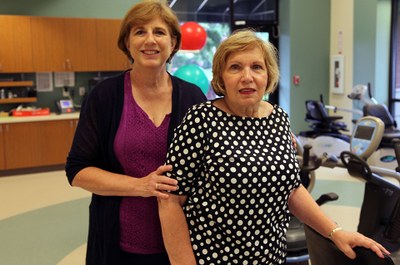Since there is no cure for MS, patients, physicians, and physical therapists often form long-term partnerships.
In the 12 years since Barbara Guiffre moved to Chapel Hill from New York City, she has spent a lot of time talking to fellow Multiple Sclerosis (MS) patients. She organized a long-running support group and has provided informal advice countless times.
“The one thing I tell everyone is that you have to love and trust all the medical people you are working with,” Guiffre said.
She trusts Diane Meyer, PT, unconditionally.
“I’ve told Diane many times that she’s never allowed to retire,” Guiffre said. “I give her complete credit for the fact that I’m still walking.”
Each person with MS has a unique set of symptoms and each person’s disease will progress at a different rate. This can increase the complexity of the care needed to treat patients. Since there is no cure for MS, patients, physicians, and physical therapists often form long-term partnerships.

